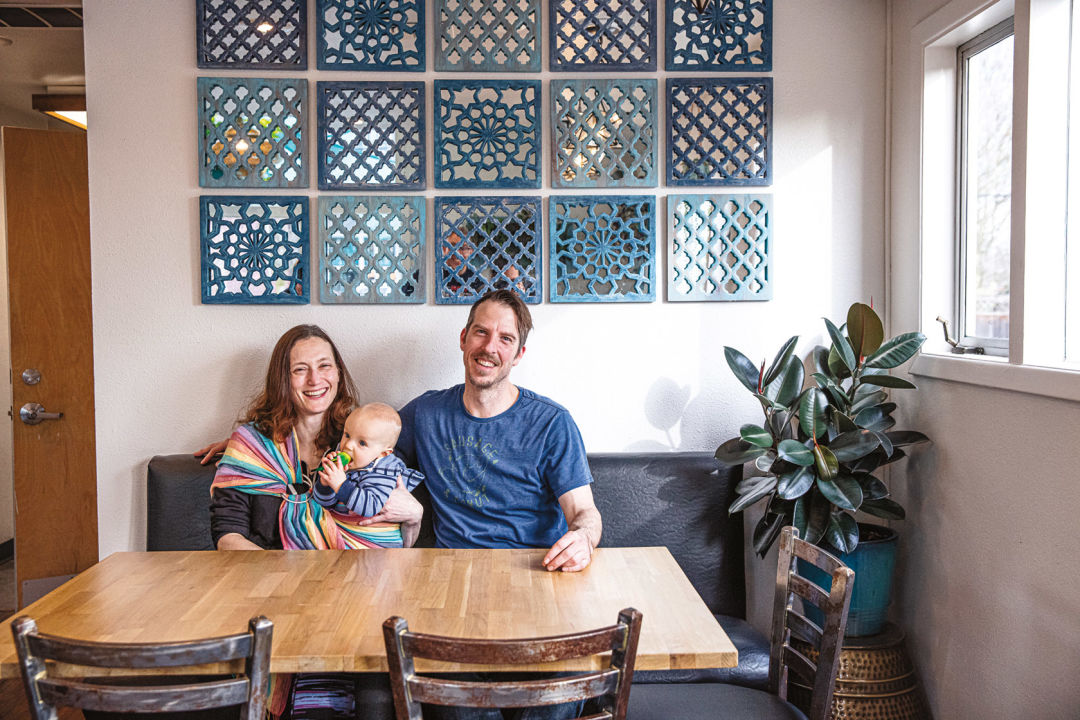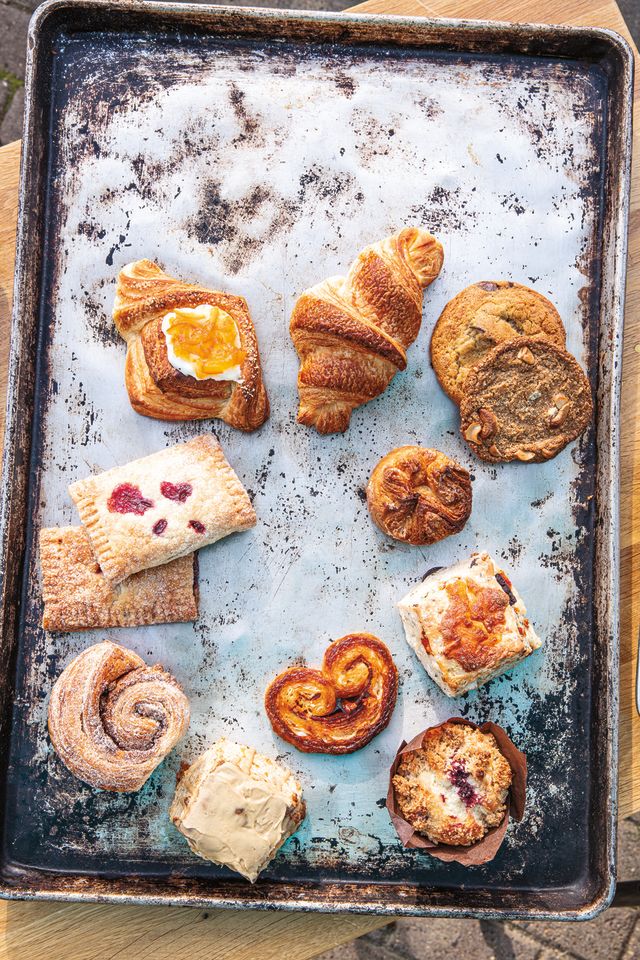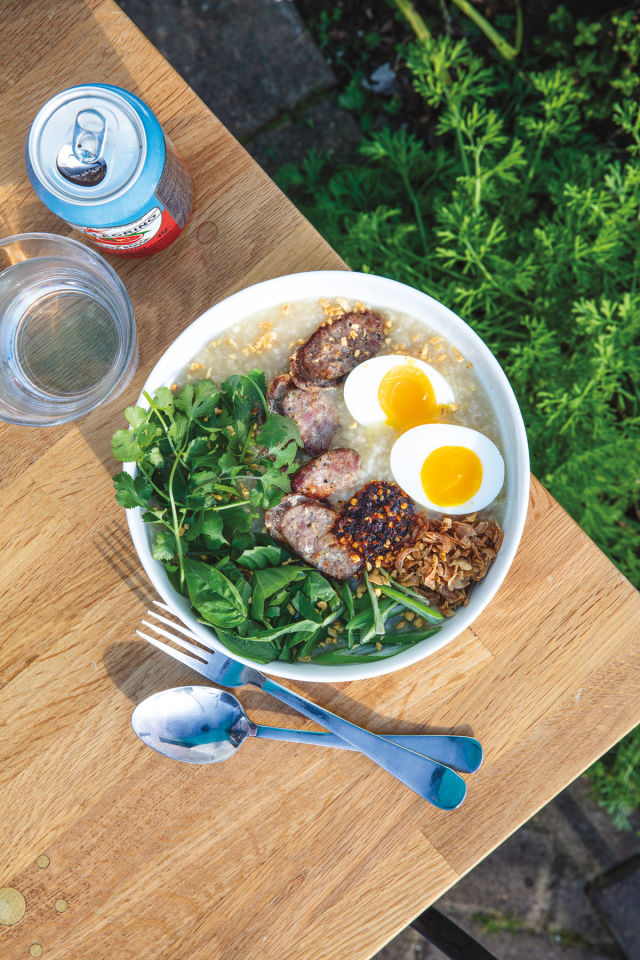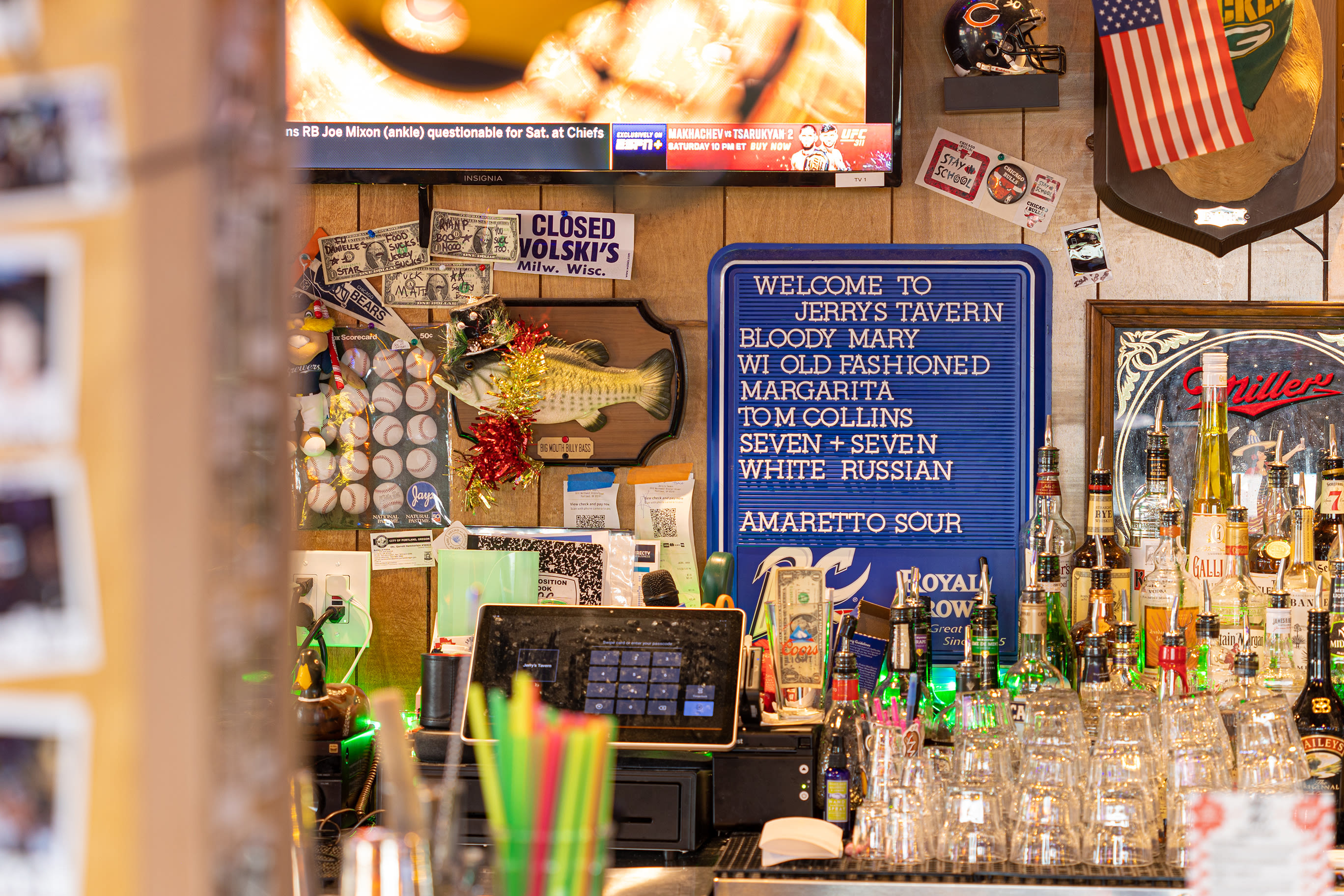After a Lifetime of Near-Hits, Communion Bakehouse Finds a Promising Home in Westmoreland

Baker Katharine Zacher and chef Ryan Ostler (with baby Laszlo) at their Communion Bakeshop.
Image: Stuart Mullenberg
Editor's note, April 2: In February, when Portland Monthly food critic Karen Brooks wrote this review for our April issue, she felt she had discovered a real gem. By the time it landed, the world had turned upside down. Read the review—it’s a charmer. But also read our follow-up story: what happened to chef-couple Ryan Ostler and Katherine Zacher after the pandemic broke.
It’s another Sunday morning at Communion Bakehouse, an under-the-radar café on a sleepy stretch of SE Milwaukie Avenue, and I’m feeling a little agitated, a little Ray Liotta. Tables are tight, so to eat here is to know thy neighbor. Two things become clear: 1) Kids who bounce like frantic metronomes in their seats get doughnuts on demand. 2) Nearly every adult is eating the kitchen’s “All-American Breakfast.” Everyone is happy. Fine, good. Who am I to judge?
Still, I want to scream: “People, people, the bacon palmier!” The French puff-pastry cookie, nicknamed “pig’s ear” for its shape, is known for its textural exhilaration, an intensity of crisp-crackle-shatter-crunch. Communion Bakehouse adds a bonus: an embedded arc of sweet, chewy bacon, its lustrous fat leeching into the sugared pastry curls. Pig’s ear, indeed.

Image: Stuart Mullenberg
I want to yell: “People, try the jook!” The thunderous rice porridge is awash in charred Thai pork sausage, fried chicken skin, bright herbs, and jammy halved ramen eggs. The pastry case just inside the door? Total insanity for a kitchen this small. Minimally, there are two kinds of croissants, Danish pastries, muffins, blobby fruit scones, burnt Basque cheesecake, monkey bread, kouign-amann, a handpie, and, yes, a loaded potato scone. That’s not counting the homemade bread and breakfast sandwich buns. And you’re ordering the All-American Breakfast? Just sayin’.
Then again, Austin-born chef Ryan Ostler and baking talent Katharine Zacher, a pair of industry vets, always seem one beat ahead of the curve, be it elevated bar cuisine, twisty roadhouse cooking, or even Asian-Southern barbecue long before Eem won over Portland last year.
But the Fates refused to smile. While charting a path in San Francisco after gigs at Michelin-starred kitchens, the couple’s edgy drinking snacks and whoopie pies charmed the city’s food critics, but the cash register’s average nightly tally at their SF space, Broken Record, told a different story: $40 in profits. On off nights, they joined a small circle of food creatives inventing pop-up culture, only to watch fellow cooks like Danny Bowien (Mission Chinese Food) and Jason Fox (Commonwealth) ride that freewheeling energy into stardom. Later, at a place called Hi-Lo BBQ, Ostler jumped at the chance to wrangle a fancy smoker. It was big enough for six whole hogs. It also polluted an entire neighborhood and closed a year later.
Then came a Portland move and, in 2016, Ostler’s Jook Joint, a food cart selling coconut milk hush puppies, Thai porridge clad in smoked Texas brisket, and daily sell-outs. Portland Monthly likened it to “a high five between a Thai grandma and a Southern pit boss.” Ostler quit after a year, having discovered the dark side of downtown’s cart life: untenable fees and junkie needles.
Communion Bakehouse opened last year—a modest brick-and-mortar for Ostler and Zacher to call their own at last, super-
casual and beaming the sounds of the ’60s. It hasn’t been easy, of course. They opened for breakfast and lunch, closed for a family emergency, then reopened for dinner only, confusing regulars. Now, behind a sweet weekend brunch, they’re finally getting traction. It’s not a daring menu, more like a super-scratch Applebee’s kitchen, juggling the wants and needs of the neighborhood with a love of baking and an urge to plant sunflower seed pesto on a fried-egg sandwich. If Ostler and Zacher are a bit gun-shy, who can blame them?

Ostler’s spicy Thai jook porridge
Image: Stuart Mullenberg
Personally, I’m never leaving without a handpie (extra points for the sheer gluttony of almond paste). And, of course, the bacon palmier (get two; no one is looking). I liked some other pastries better than others, wishing at times flavors popped a bit more, but everything tasted legit, crispy and butter-crumbly in the right places. That alone is a miracle, given that Zacher is strapped with a pizza oven inherited from the former tenant. Lacking humidity control, they’ve resorted to pouring boiling water over lava rocks stuffed inside. Confessed Zacher: “It’s like driving a semi-truck with the brakes on.”
Everything gets a personal touch—even that All-American Breakfast, the plate edged with toasted triangles of the kitchen’s artful sourdough levain, made with techniques Zacher gleaned at Bar Tartine from San Francisco yeast master Chad Robertson. Grab anything with Ostler’s melting smoked beef brisket, including a hash. Unlike in the usual hash-mash, each individual element is meticulously roasted, from brussels sprouts to poblano peppers, giving every bite chunk and char. I wish the waffle were crispier, though there’s no faulting the fried chicken on top, prepped sous-vide in buttermilk and house jerk spices, and dusted in what Ostler calls the “KFC treatment.”
Pizza, the centerpiece of the evening menu, still needs work. Surprising given the baking chops, the sourdough crust is without tang or great chew. Toppings are tasty, smoked gouda and spicy salami to fennel sausage and fontina. But the ratios are lopsided, a crush of things weighted down in the middle. Overkill is bit of a tendency, generosity to a fault. For satisfaction, look to the nightly specials, perhaps a Portuguese caldo verde soup teeming with the kitchen’s merguez sausage and pistachio salsa verde.
The best thing about Communion Bakehouse? Its realness. You’ll find no tortured concepts, no chef titles, and no live-edge counters. It reminds me of Old Portland, pre-Bon Appétit Portland, nobody-cares-about-Portland Portland, a time when every neighborhood had a low-key gem run by cooks who lived to share their food. We knew we were in good hands. We felt like the luckiest people in the world. I hope this one sticks.




